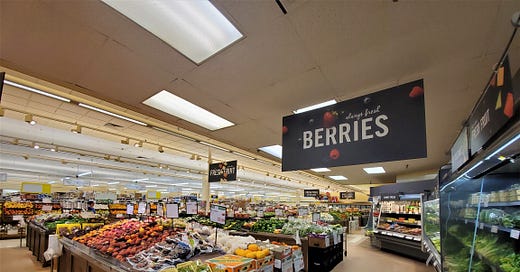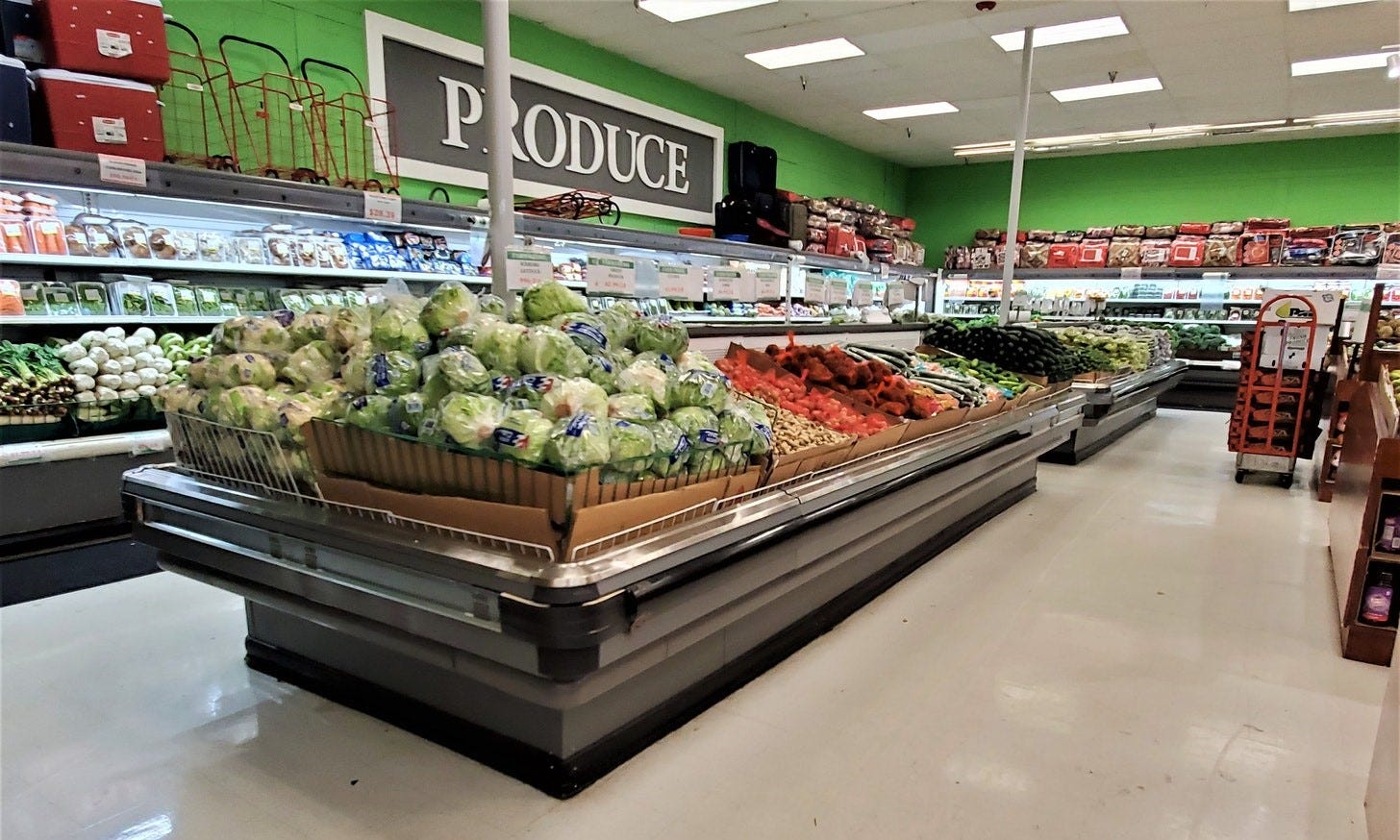Last week I wrote about a new supermarket in a former Toys ‘R’ Us building, the second in a two-part series on “secondhand supermarkets”).
I was mainly observing how new tenants use existing commercial spaces, especially when the new stores are budget-oriented. The creative adaptation of existing space, rather than a full remodeling, is par for the course, and I find it interesting. Often, previous incarnations of a chain store are only ever preserved when the building ends up in the hands of someone else, who freezes it at a particular point in time or only mildly alters it. (I gave the example of a little produce store and deli in New Jersey in an old A&P location, which to this day is a fairly well-preserved 1970s A&P interior!)
The Toys ‘R’ Us/supermarket raised a different curiosity, because all of its fixtures appear used. They must have been purchased from a used supermarket fixture dealer, which is a secondhand market I didn’t really know existed. It’s interesting to me that those fixtures are probably identifiable as coming from a particular chain during a particular era, if you know what design elements and visual clues to look for.
But in the course of reading about that former Toys ‘R’ Us, now the second location for a tiny local chain called Food Star, I came across some...very different opinions, and thought they could make a whole post. Food Star identifies itself as an international supermarket, which generally indicates, in this region anyway, a Latin-heavy selection with smaller selections of things like African, Indian, and East/Southeast Asian foods. (There’s generally a tiny little “American” aisle too, where you can buy items like Knorr rice packets and Hellman’s mayo.) There are a lot of these chains in the area: Global Foods, Fresh World, Bestway, New Grand Mart. Some are more focused on a particular culinary area—Bestway is largely Latin, and New Grand Mart leans Asian—but they all have an international selection. What they don’t have is European groceries or “gourmet” or “specialty” foods of the sort you’d find in an upscale food store.
This Yelp review, by a Caribbean woman, caught my attention:
Finally! First grocery store in NOVA that has all of the ingredients I need to make my food (Caribbean). Very clean and wide array of options! Very well priced also. Would love to see Golden Ray Butter in the dairy section but otherwise 10 out of 10!
As diverse as this region is, this medium-sized local supermarket was the first store to stock whatever specific ingredients this woman had been looking for. I wonder what the business and import side of that looks like. An ingredient that defines someone’s childhood food can be completely unknown here. Of course, this is probably the case for hundreds, maybe thousands of ingredients and recipes. But I digress.
Then, there was this comment left on a post at a progressive-leaning local blog covering land use, redevelopment, and local politics in the Annandale and Bailey’s Crossroads area of Fairfax County:
Now Tows R US [sic] is going to be a junk grocery store under the guise of an international foods store........please. This area is an [sic] ever increasing decline.
Another commenter lower down tries to add a little nuance:
I don’t think anyone has issues with international grocery stores. There are so many in this area already. This is a budget store that sells low end products—similar in nature to a pic-n-pay you would find in rural poor areas. That is not the kind of businesses we should want. The prior posters were correct—we have had some nice stores and restaurants but they left this area because the revenue wasn’t there. The rents decrease in the area and allow for lower end businesses to lease. Until we improve transit and attract better quality of businesses the area will stagnate.
This is, well, largely wrong. (But we should improve transit!) What this fellow thinks he’s describing, when he says “the rents decrease in the area and allow for lower end businesses to lease,” is decline and stagnation. That can be the outcome, certainly, but the reality is that there’s a glut of aging retail space, and the older, cheaper properties often serve as affordable space for immigrants and others who don’t have a lot of cash and are trying out running an independent business. There’s a reason that new mixed-use developments tend to be anchored by chains, while aging strip malls tend to skew more heavily towards local enterprises. The idea that there’s something wrong with commercial space that ordinary people can afford, and that the businesses that make use of cheap commercial space are inferior, is basically the definition of classist, snobbish, and elitist. We have to balance redevelopment and more intensive land use with the benefits of affordable commercial space. I think of this concern as “commercial gentrification.”
But on the other hand, there are low-quality stores. So perhaps the question is, is Food Star a “junk” grocery store? Well, obviously not to its target market, which is largely working-class and immigrant. Obviously not to that Caribbean woman. It is a budget supermarket, and it isn’t as pretty as a larger chain store.
But I walked around it, and the food was pretty much par for the course for this type of store. The beef is not USDA Choice, there aren’t many premium, high-cost ingredients, but it’s...meat, veggies, and fish. It looks fine. Nothing is moldy or damaged or of obviously inferior quality. And the packaged food is the same everywhere, of course.
I suspect that calling a store like this a “junk grocery store” is a way of criticizing the demographic changes in this area without obviously seeming to do so. It even allows you to pretend to care about the poor shoppers you claim are being exploited. But it’s often cloaking a nasty sentiment. Safeway or Aldi are conventionally “American” supermarkets, but they’re also budget-oriented (at least here; I’ve seen much larger and somewhat higher-end Safeways in other parts of the country.) The difference is that aesthetically their stores tend to be newer, and their selections tend to be familiar. And, of course, they aren’t primarily serving a demographic that some folks see as not really belonging here.
My wife and I do most of our shopping at H-Mart, a Korean-focused supermarket chain, as well as Wegmans and Trader Joe’s. While I don’t know what to do with most of the items for sale in these international stores, I’ve always enjoyed browsing them. Sometimes you’ll see low-quality meat or fish for sale, but generally they’re just decent stores for people who don’t have a lot of money. They fill a need.
It’s been many years since I’ve really even noticed the smell of the fish counter (because actual whole fish are processed, displayed, and sold) or the noise of kids running around inside or the marked-up floors in places like this. There are lots of small halal butcher shops and other small grocery stores all throughout this area. I find it interesting that there’s this whole world of food that is invisible to a lot of white Americans, like the folks writing those comments about this supermarket. They’re so invested in an ideal image of what this region once was, that they have put blinders on as to the best of what it is now, even if it isn’t perfect. No place ever is. I don’t say any of this ideologically, or to be politically correct. Having lived here a few years, I just feel that it’s true.
Readers: I’m curious if you’ve browsed or shopped at these types of stores (if you’re not from the cultural background they appeal to). What’s your impression of them?
Related Reading:






I generally never use these stores. I have no reason to since the nearby Harris Teeter, Giant, etc. fulfill our grocery needs. But of all the businesses to take the place of the Toys R Us, the Food Star seems like the perfect -- if unusual -- choice. It's certainly preferable to a dollar store style chain, which seem to be the easiest and most common filler of vacant retail spaces of this size. And of course it's much better than the site sitting empty for years as the property becomes a blight -- a real concern for these type of retail properties. The Food Star serves a basic need for the local community. I lived near the old one on Columbia Pike in Arlington and never heard complaints about its quality or prices.